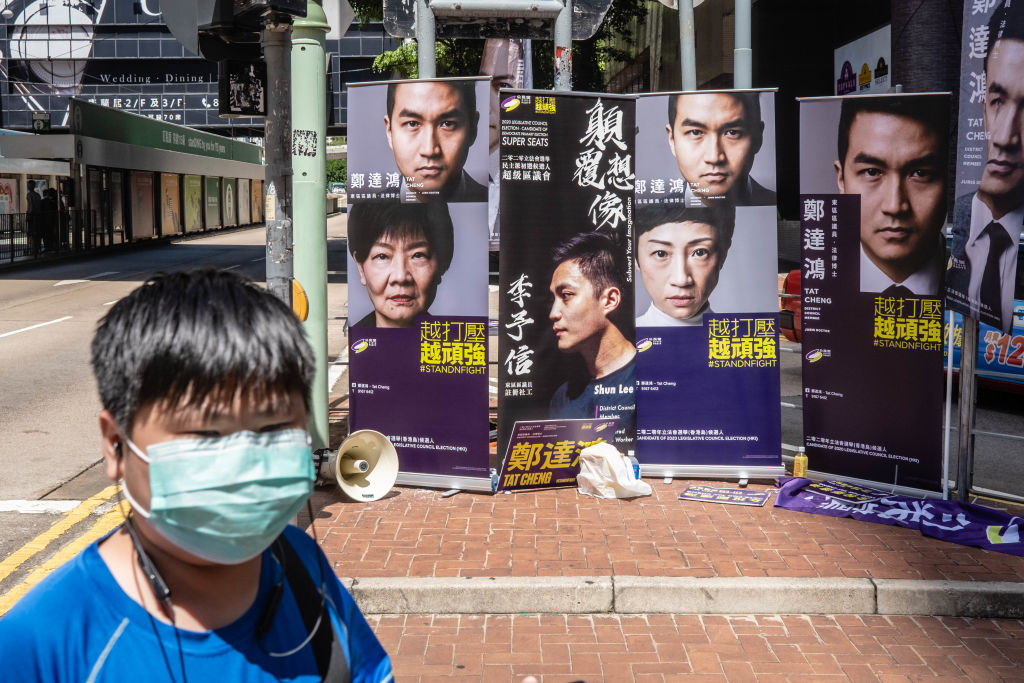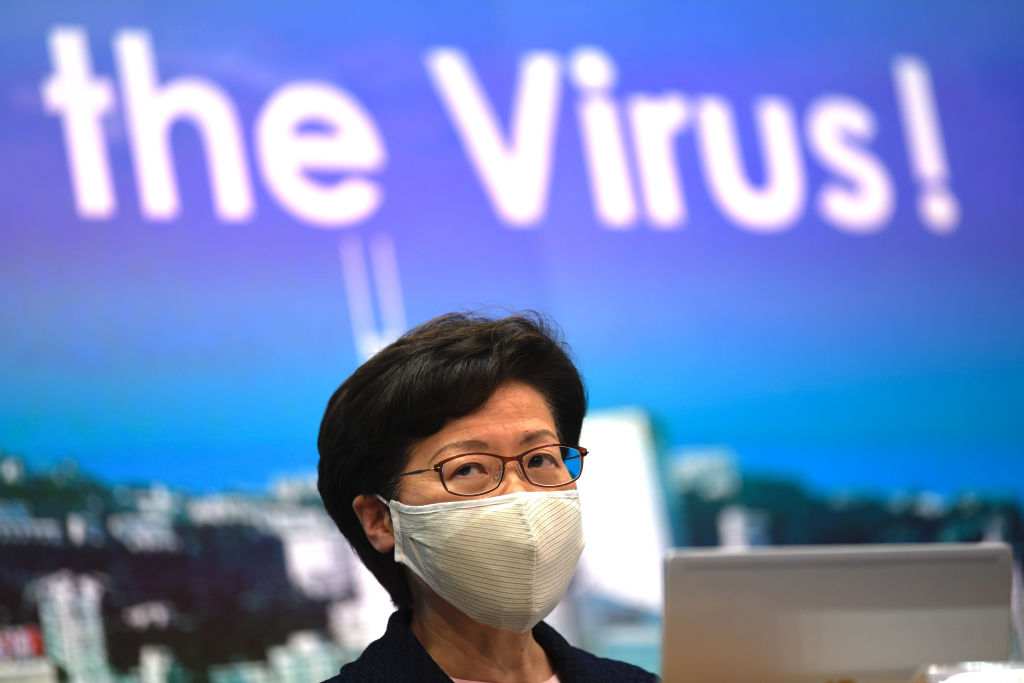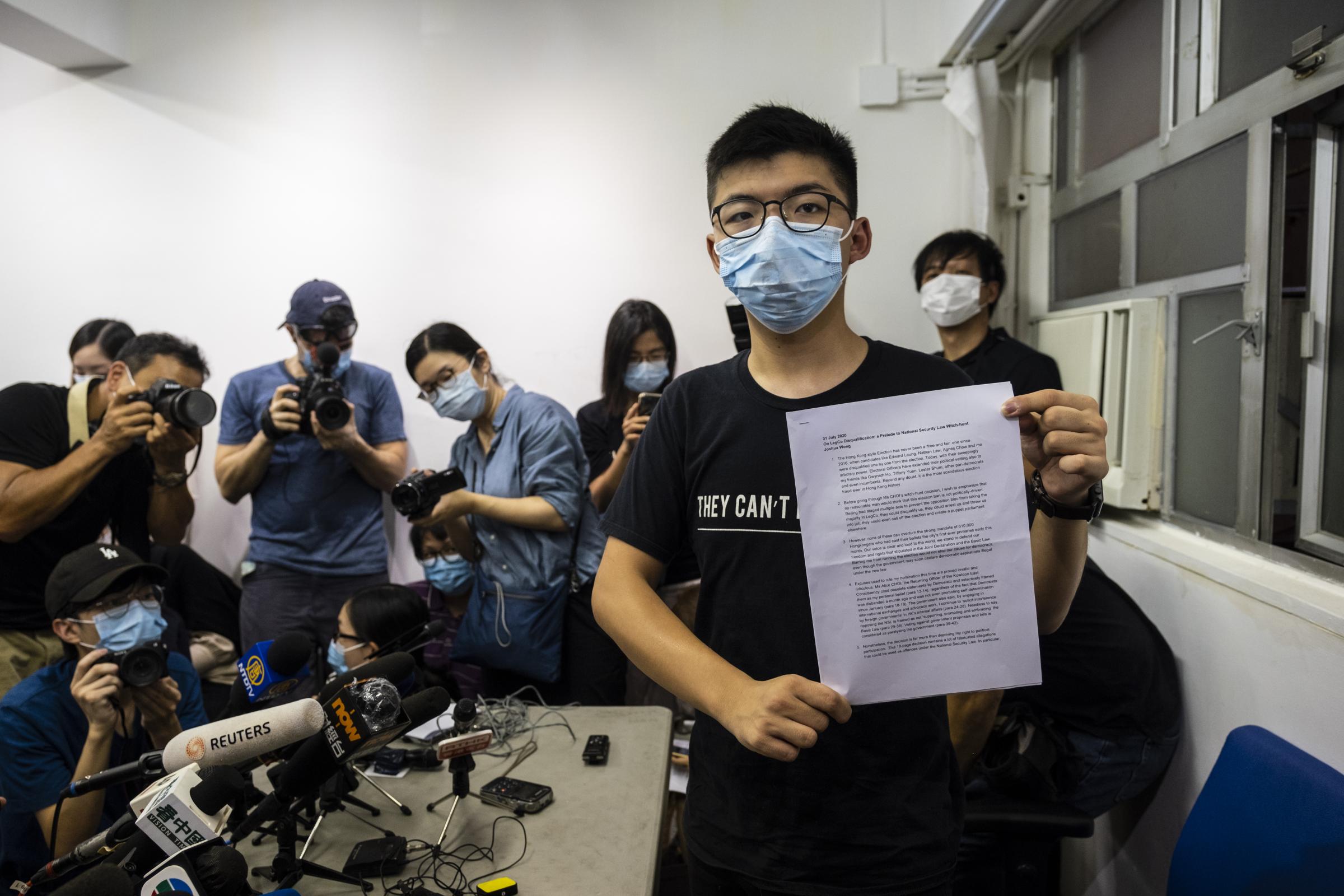
The day after President Donald Trump tweeted about delaying the U.S. election, prompting swift outcry over the unconstitutionality and breach of democratic norms, Hong Kong postponed its own vote.
At a press conference on July 31, hastily called as a tropical cyclone skirted the enclave, top official Carrie Lam pointed to the resurgent coronavirus outbreak. Daily cases had mostly broken into triple digits since July 19—in a city where the previous high was 82 cases, recorded on Mar. 29.
With the financial hub in the throes of its worst flare-up since the disease began spreading, Lam said she worried that up to 4.4 million voters, lining up to cast ballots in elections to the legislature, would exacerbate the situation. She also pointed out that many outside the city wouldn’t be able to travel back to participate. As a consequence, she declared the vote postponed for a year.
Many saw her justification for such a long delay as unconvincing, not least because she admitted there was no consultation with the government’s medical advisors on the pandemic beforehand. Academics, lawyers, health experts, the political opposition and voters have since questioned the necessity and legality of the delay.
“The government has so little trust from the people,” says Ma Ngok, an associate professor of political science at the Chinese University of Hong Kong. “They have deprived the Hong Kong people of their voting rights and a lot of people believe it is just because the government is afraid of losing the election and losing their majority.”
Amid the global pandemic, territories big and small, rich and poor, have had to grapple with the challenge of balancing the right to vote with public health precautions. The majority have opted for some type of delay; according to research by the Virginia-based International Foundation for Electoral Systems (IFES), 109 election events have been pushed off as of July 31.
But changing the schedule of an election, for whatever reason, tends to be a fraught endeavor that risks accusations of manipulation and puts the credibility of the whole system on the line. Whether a postponement is seen as legitimate or not has less to do with the decision on the vote itself than on how much consensus exists, according to analysts.
Read more: How COVID-19 Changed Everything About the 2020 Election
“If you look around the world at where elections are being postponed to a later day what’s important is for the government to build a political consensus, meaning to get both the pro-government parties and candidates as well as the opposition parties and candidates involved to agree to this very important decision, to make sure that the decision is credible,” says Kenneth Chan a political scientist at Hong Kong Baptist University who initiated the Election Observation Project. “This didn’t happen in Hong Kong.”
Instead, the political opposition slammed the decision as an attempt to stymie their electoral momentum. They had hoped the contest would allow them to translate their landslide win at neighbor-level polls last year into their first majority at the more powerful Legislative Council. In mid-July, over 600,000 people participated in the pro-democracy camp’s primaries despite government’s warnings that they might be illegal.
“Clearly it is the largest election fraud in #HK’s history,” prominent activist Joshua Wong tweeted.
The delay comes as Beijing moves to quell upheaval in the city and crush political dissent following more than a year of sometimes violent unrest. The highly anticipated Sept. 6 poll would have been the first official vote since Beijing imposed a national security law that was drafted in secret and gives the Chinese government sweeping new powers over the semi-autonomous region.
“This is what makes the decision by Carrie Lam’s government entirely political: it prohibits contestation and participation at the exact moment the pro-Beijing camp was most threatened,” says Lee Morgenbesser, a senior lecturer at Griffith University who studies elections in authoritarian states.
“The decision to postpone the election for at least a year puts Hong Kong in the company of Cameroon, Poland, and Uganda, which are also all countries subject to authoritarian rule,” he adds.

‘People suspect foul play’
In the week running up to the postponement, the opposition was already reeling from a series of blows, including the arrests of four members of a pro-independence group, the disqualification of a dozen democracy candidates from the election and the firing of a tenured law professor who is a key campaigner in the protest movement.
Deferring the election removes a potential release valve for Hong Kong’s increasing polarized society, and risks bottled up frustrations erupting at some later date. “There is no guarantee that our electoral fortunes will improve in one year’s time,” concedes pro-Beijing lawmaker Regina Ip. “In fact, more anger could be built up.”
Several public health experts declined to speak on the record about the decision to delay the vote, citing the current political climate and fear of the national security law. But more than one said they did not find the length of the postponement logical and suggested the government could have waited another few weeks, then followed the examples set by Singapore and South Korea, which both successfully held polls with mitigation measures earlier this year. (In South Korea, some 29 million people turned up to vote in parliamentary elections but thanks to strict social distancing, no infections were recorded as a result.)
Political analysts say this might have made a difference in public perception. “If it was two or three weeks, I think a lot of people could wait,” says Ma at Chinese University. “But one year? People suspect foul play.”
Under Hong Kong’s laws, an election can only be postponed for up to 14 days in the event of “any danger to public health or safety.” To push off the vote until Sept. 5, 2021, Lam invoked a rarely used colonial-era emergency ordinance. She acknowledged this created a legislative vacuum, since the Basic Law, the city’s constitution, stipulates four-year term limits for lawmakers. So she asked the Standing Committee of the National People’s Congress, China’s rubber stamp parliament, for advice on how to handle the quandry.
For some of the city’s lawyers, this request set off alarms. The Hong Kong Bar Association accused Lam of degrading the city’s rule of law by “effectively inviting the Central Government to override” local laws. Invoking the emergency legislation may turn out to have been illegal, it said in a statement.
In response, a government spokesperson said a 14-day suspension was unpractical in the current situation; with the current wave of infections plaguing Hong Kong likely last for several weeks, there was a chance that it would need to be repeatedly invoked. Continued suspensions, the spokesperson said, would “likely be regarded as a misuse of power subject to legal challenge.”
‘A little bit of a surprise’
International observers note that Hong Kong is not alone in experiencing backlash over pandemic polls.
“This has been true for both decisions to postpone as well as to hold elections,” says Laura Thornton, global program director at the Stockholm-based International Institute for Democracy and Electoral Assistance (IDEA).
IDEA’S research was cited by Lam in her decision to push off the vote, though Thornton says the organization has not made any “definitive statement” about whether elections should be held during the health crisis.
“Again, it is about how the decision is made—whether it is unilateral or involved a political consensus,” she told TIME by email. “Did all key political players…sit down and discuss the risks and agree upon a way forward? Were health officials consulted in the decision? Were practical arrangements reviewed, such as special voting arrangements like mail-in ballots or early voting? All these considerations ideally would be discussed through a democratic process.”
Within the medical community, some felt the lack of consultation with health experts undermined the grounds for the delay.
The move makes little sense as an outbreak control measure, says Ivan Law, vice chair of the Hospital Authority Employees Alliance—one of 91 trade unions formed between Jan. 2019 and Mar. 2020 in a bid to boost Hong Kong’s democracy movement. “It’s not appropriate to, on the one side, delay the election and then have people still going to work” on the subway, he says.
An official at the Registration and Electoral Office (REO) admitted that the deferment came as a “little bit of a surprise” even to the government office responsible for staging the vote. “We were undertaking full efforts to prepare for the 2020 elections until we saw the announcement of the chief executive,” says Charlie Chan, an information officer with the REO.

Ahead of the announcement, the chair of the Electoral Affairs Commission wrote to Lam outlining the challenges of holding the vote amid the current outbreak, as well as possible precautionary measures, but did not make a recommendation to call it off, Chan says. (Afterward, the EAC said it “understands and respects the Government’s decision.”)
Beijing’s Hong Kong and Macau Affairs Office described the postponement as a “very necessary.” The decision, it said, wouldn’t “harm the democratic rights and freedoms enjoyed by Hong Kong residents.”
The National People’s Congress Standing Committee is expected to deliberate Hong Kong’s political vacuum at its upcoming session starting Saturday. To fill the current legislative void, Chinese government officials have floated the possibility of an extended one-year parliamentary term—but it might not include four recently disqualified incumbent lawmakers and would leave the democracy bloc, once again, in a minority.
This arrangement is particularly objectionable to the pro-democracy candidates and their supporters, who had hoped success at the ballot box this year would offer legislative means to push the government to accede to the protest demands, including universal suffrage. Under the existing laws, Hongkongers are not able to fully elect their own legislature (half the seats are reserved for professional interest groups such as industrialists and accountants). The city’s leader is meanwhile chosen by a committee of business leaders, professionals and other elites. Since 2014, this system has fueled street protests calling for greater political freedoms. The next year does not appear to be bringing that goal any closer.
“This is universal non-suffrage,” says Ma of the situation created by the election delay. He is no more optimistic about the future. “We are not 100% sure there will be an election in 2021,” he says. “If they can change it for one year then they can put in another rule and change it again. It is always possible.”
More Must-Reads from TIME
- Cybersecurity Experts Are Sounding the Alarm on DOGE
- Meet the 2025 Women of the Year
- The Harsh Truth About Disability Inclusion
- Why Do More Young Adults Have Cancer?
- Colman Domingo Leads With Radical Love
- How to Get Better at Doing Things Alone
- Michelle Zauner Stares Down the Darkness
Write to Laignee Barron / Hong Kong at Laignee.Barron@time.com